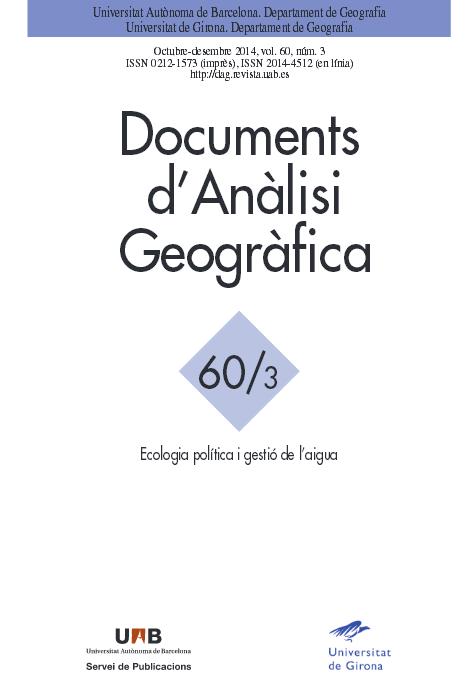Competition for water use in the province of Alicante (Spain): management experiences for harmonizing tourist and agricultural uses
Article Sidebar

Main Article Content
Antonio M. Rico Amorós
Universidad de Alicante. Instituto Interuniversitario de Geografía
Jorge Olcina Cantos
Universidad de Alicante. Instituto Interuniversitario de Geografía
Carlos J. Baños Castiñeira
Universidad de Alicante. Instituto Interuniversitario de Geografía
Water availability in quantity and quality is a decisive factor to attend the urban, tourist and agricultural demands in areas with natural scarcity of resources. In the province of Alicante in order to ensure these demands, it has been resorted to hydraulic traditional solutions such as transfers and aquifers exploitation and new ones as growing use of non-conventional sources, increasing the efficiency of water use and others based on the
harmonization of different uses. In this paper, it is analyzed the most important models developed in Alicante for harmonizing tourist and agricultural water uses: the collective management of overexploited aquifers (Junta Central de Usuarios del Vinalopó) and the agreements signed between urban areas and farmers based on the exchange of wastewater and clean water for its use in irrigation and tourism activities, respectively (Consorcio de Aguas de la Marina Baja). It is highlighted the growing importance of sewage regenerated for harmonizing tourist and agricultural water uses.
harmonization of different uses. In this paper, it is analyzed the most important models developed in Alicante for harmonizing tourist and agricultural water uses: the collective management of overexploited aquifers (Junta Central de Usuarios del Vinalopó) and the agreements signed between urban areas and farmers based on the exchange of wastewater and clean water for its use in irrigation and tourism activities, respectively (Consorcio de Aguas de la Marina Baja). It is highlighted the growing importance of sewage regenerated for harmonizing tourist and agricultural water uses.
Article Details
How to Cite
Rico Amorós, Antonio M. et al. “Competition for water use in the province of Alicante (Spain): management experiences for harmonizing tourist and agricultural uses”. Documents d’Anàlisi Geogràfica, vol.VOL 60, no. 3, pp. 523-48, https://raco.cat/index.php/DocumentsAnalisi/article/view/291317.
Most read articles by the same author(s)
- Antonio M. Rico Amorós, María Hernández Hernández, Ordenación del territorio, escasez de recursos hídricos, competencia de usos e intensificación de las demandas urbano-turísticas en la Comunidad Valenciana , Documents d'Anàlisi Geogràfica: No. 51 (2008)
- Benito Zaragozí Zaragozí, Alfredo Ramón Morte, Jorge Olcina Cantos, Application of a geographic model with climate information to calculate the water balance of the Marina Baja area of Alicante , Documents d'Anàlisi Geogràfica: Vol. 62 No. 1 (2016): Miscel·lani